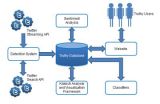Heartbreak puts the brakes on your heart
2010-09-29
(Press-News.org) Social rejection isn't just emotionally upsetting; it also upsets your heart. A new study finds that being rejected by another person makes your heart rate drop for a moment. The study is published in Psychological Science, a journal of the Association for Psychological Science.
Research has shown that the brain processes physical and social pain in some of the same regions. Bregtje Gunther Moor, Eveline A. Crone, and Maurits W. van der Molen of the University of Amsterdam and Leiden University in the Netherlands wanted to find out how social pain affects you physically.
For the study, volunteers were asked to send the researchers a photograph of themselves. They were told that for a study on first impressions, students at another university would look at the photo to decide whether they liked the volunteer. This was just a cover story for the real experiment. A few weeks later, each volunteer came to the laboratory, had wires placed on their chest for an electrocardiogram, and looked at a series of unfamiliar faces—actual students from another university. For each face, the volunteer was asked to guess whether that student liked them. Then they were told whether the person actually "liked" them or not—although this was merely a computer-generated response.
Each participant's heart rate fell in anticipation before they found out the person's supposed opinion of them. Heart rate was also affected after they were told the other person's opinion—if they were told the other student didn't like them, the heart dropped further, and was slower to get back up to the usual rate. The heart rate slowed more in people who expected that the other person would like them.
The results suggest that the autonomic nervous system, which controls such functions as digestion and circulation, gets involved when you're socially rejected. "Unexpected social rejection could literally feel 'heartbreaking,' as reflected by a transient slowing of heart rate," the researchers write.
###
For more information about this study, please contact Bregtje Gunther Moor at b.gunthermoor@uva.nl.
The APS journal Psychological Science is the highest ranked empirical journal in psychology. For a copy of the article "The Heartbrake of Social Rejection: Heart Rate Deceleration in Response to Unexpected Peer Rejection" and access to other Psychological Science research findings, please contact Keri Chiodo at 202-293-9300 or kchiodo@psychologicalscience.org.
END
ELSE PRESS RELEASES FROM THIS DATE:
2010-09-29
Results from a 12-month multi-center clinical trial did not show therapeutic benefit of abatacept over placebo in patients with non-life threatening systemic lupus erythematosus (SLE). Abatacept failed to prevent new disease flares in SLE patients tapered from corticosteroids in an analysis where mild, moderate and severe disease flares were evaluated together. Full details of the phase IIb clinical trial are published in the October issue of Arthritis & Rheumatism, a journal of the American College of Rheumatology (ACR).
The ACR estimates that 161,000 to 322,000 adults ...
2010-09-29
The Structural Genomics Consortium (SGC), an international public-private partnership that aims to determine three dimensional structures of medically important proteins, announced today the release into the public domain of its 1000th high resolution protein structure.
The 1000th structure – known as JmjD2C – belongs to a class of proteins involved in epigenetic signalling, a key research area for the SGC. Epigenetics is the study of inherited changes in gene expression caused by proteins such as JmjD2C which 'switch' genes on or off. It is believed that a better understanding ...
2010-09-29
HOUSTON, Sept. 28, 2010 – A large section of northwestern Harris County – particularly the Jersey Village area – is sinking rapidly, according to a University of Houston (UH) geologist who has analyzed GPS data measuring ground elevation in the Houston area.
Some points in Jersey Village are subsiding by up to 5.5 centimeters (about 2 inches) a year, said Shuhab Khan, an associate professor of geology at UH. Khan, along with UH geology professor Kevin Burke and former Ph.D. student and UH alumnus Richard Engelkemeir, studied a decade's worth of detailed GPS data measuring ...
2010-09-29
In comments sent to Secretary Kathleen Sebelius at the U.S. Department of Health and Human Services, AMIA (American Medical Informatics Association) called out 10 specific challenges to proposed modifications to HIPAA Privacy and Enforcement Rules. AMIA's comments, sent on behalf of its membership of 4,000 informatics professionals, detail key issues of concern related to the Notice of Proposed Rulemaking (NPRM) on HIPAA modifications, along with suggestions for models of change. The following areas were cited:
Business Associates and Subcontractors
Position: AMIA ...
2010-09-29
Although the magnificent frigatebird may be the least likely animal on the Galapagos Islands to be unique to the area, it turns out the Galapagos population of this tropical seabird may be its own genetically distinct species warranting a new conservation status, according to a paper by researchers at the Smithsonian Conservation Biology Institute, the Smithsonian's National Museum of Natural History and the University of Missouri-St. Louis published last week in the scientific journal Proceedings of the Royal Society B.
The Galapagos Islands, which once served as a scientific ...
2010-09-29
When the scientific and spiritual worlds collide, they do so in the most surprising ways. Classical meteorological and plant science has, in the last century, insisted that dew negatively affects plant life, leading to rot and fungus. But in the Judeo-Christian tradition, dew is most welcomed as an important source of vegetative and plant life, celebrated in poetry and prayer.
Now Prof. Pinhas Alpert of Tel Aviv University's Department of Geophysics and Planetary Sciences has developed an explanation for the perplexing paradox with his colleagues. According to scientific ...
2010-09-29
A study carried out by Spanish researchers has shown that the presence of chemical contaminants can interact with noise and modify, for good or for bad, the way in which work-related "deafness" – which is increasingly common among young people – manifests itself. Noise-related hearing loss is the most common occupational disease in Europe.
"Workers exposed to noise in the presence of metalworking fluids exhibit a delay in hearing alteration in comparison with those exposed only to noise at the same intensity. However, those exposed to noise in the presence of welding ...
2010-09-29
Astroturfers, Twitter-bombers and smear campaigners need beware this election season as a group of leading Indiana University information and computer scientists today unleashed Truthy.indiana.edu, a sophisticated new Twitter-based research tool that combines data mining, social network analysis and crowdsourcing to uncover deceptive tactics and misinformation leading up to the Nov. 2 elections.
Combing through thousands of tweets per hour in search of political keywords, the team based out of IU's School of Informatics and Computing will isolate patterns of interest ...
2010-09-29
FORT WORTH, TEXAS, USA, September 28, 2010—The outbreak of whooping cough in Texas, California, and other states this year underscores the critical importance of widespread vaccination coverage, both locally as well as around the world, said a leading global health official attending conferences on world affairs and immunization in Fort Worth this week.
Alex Palacios, a special representative of the GAVI Alliance, a public-private partnership aimed at increasing immunisation rates in poor countries, said that despite public health advances in the US and other wealthy countries ...
2010-09-29
More than half of all people are hosts to Candida albicans in their bodies. This species might be located on their skin or mucous membranes or in the intestines – frequently without causing any symptoms. However, it can be dangerous to patients whose immunological system has been weakened such as after organ transplants or chemotherapy with cancer. Then, this fungus penetrates into deeper layers of tissue and uses the blood system to spread throughout the body. In Germany alone, several thousand people die from systemic candida infections every year.
But why does Candida ...
LAST 30 PRESS RELEASES:
[Press-News.org] Heartbreak puts the brakes on your heart





